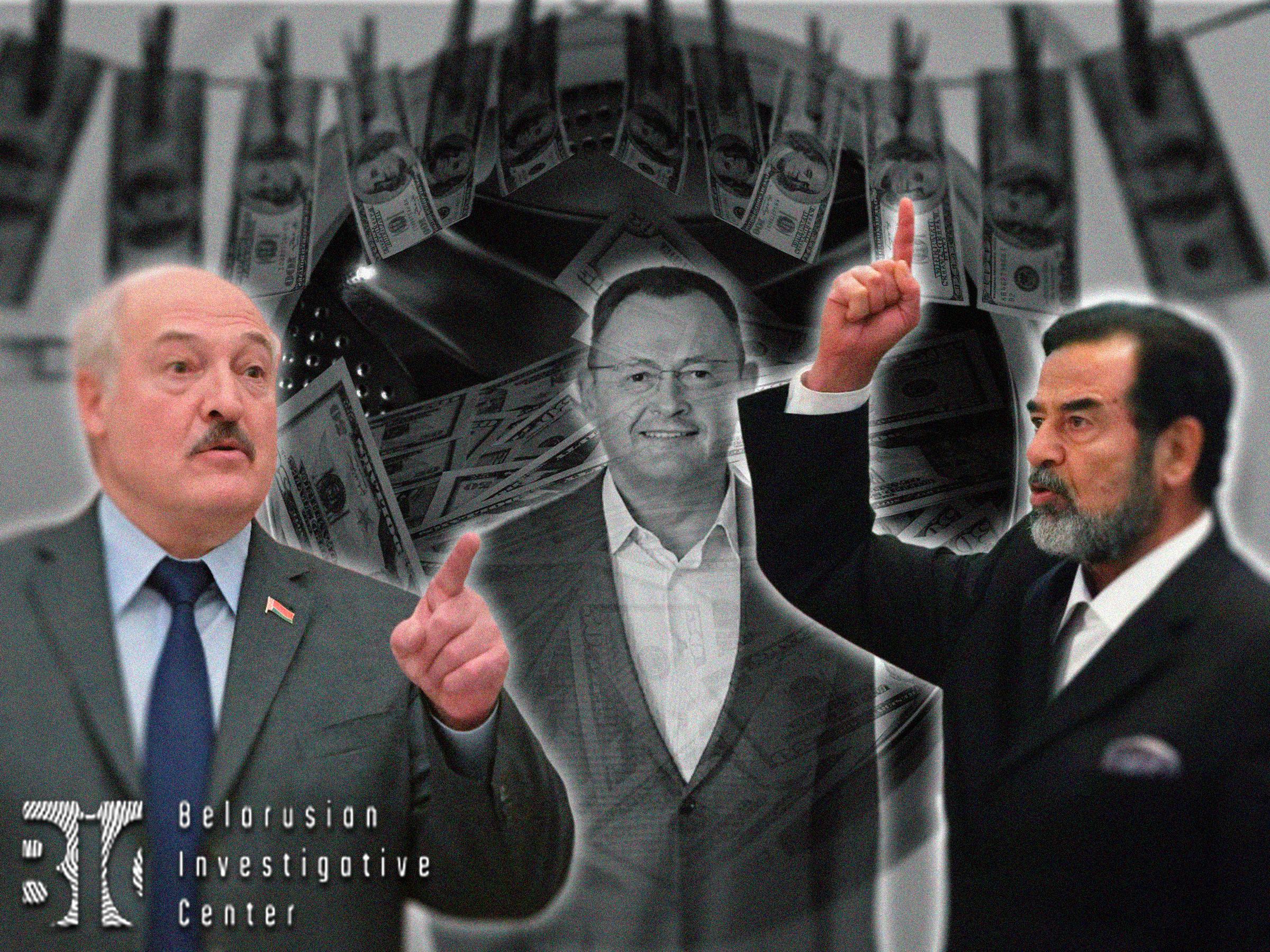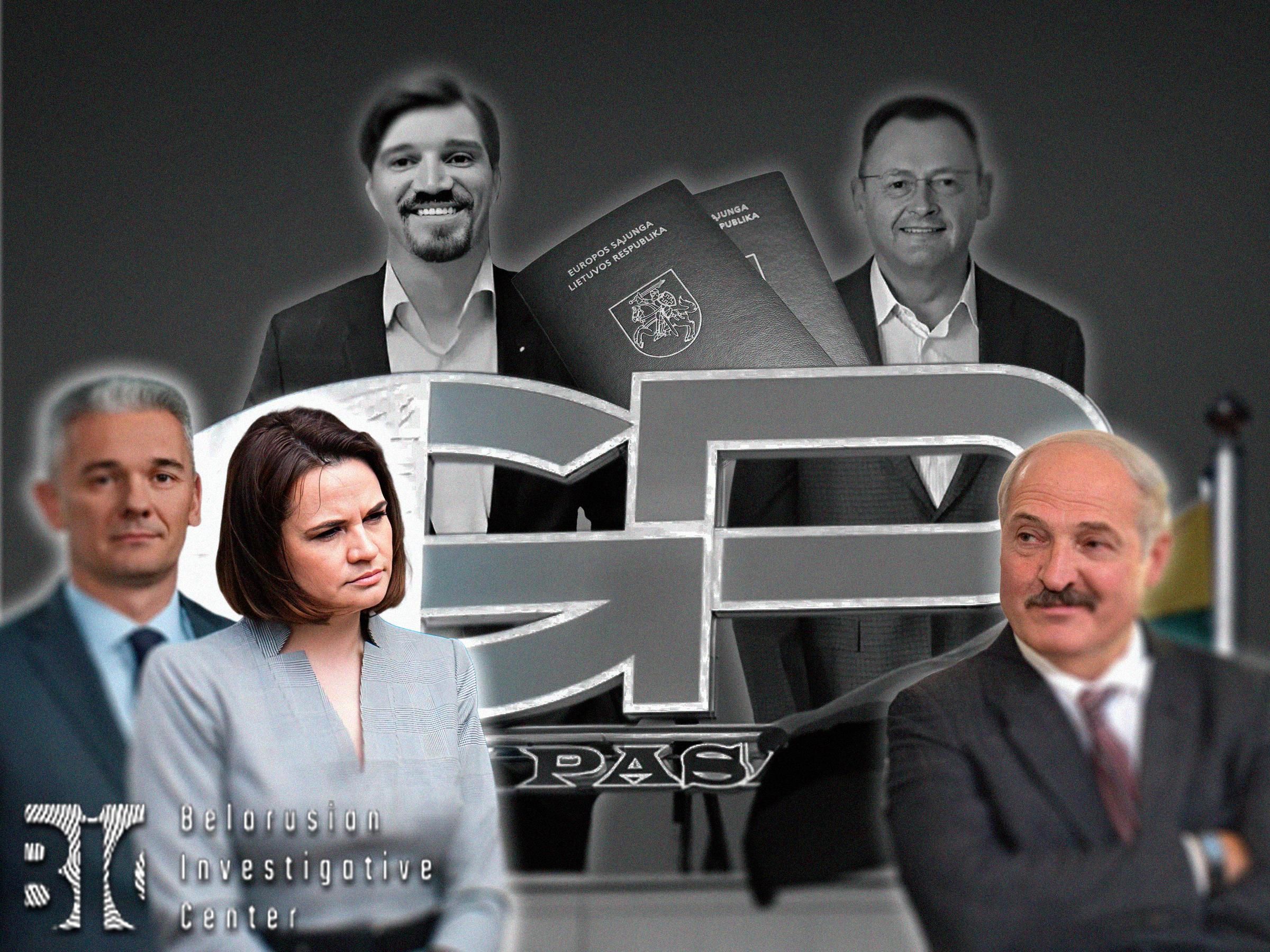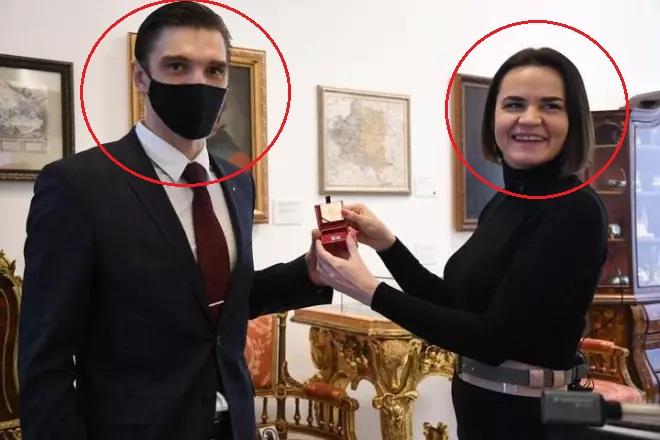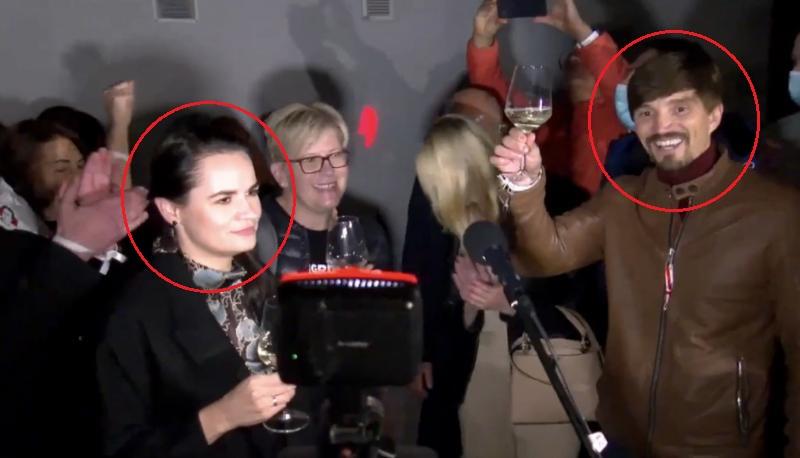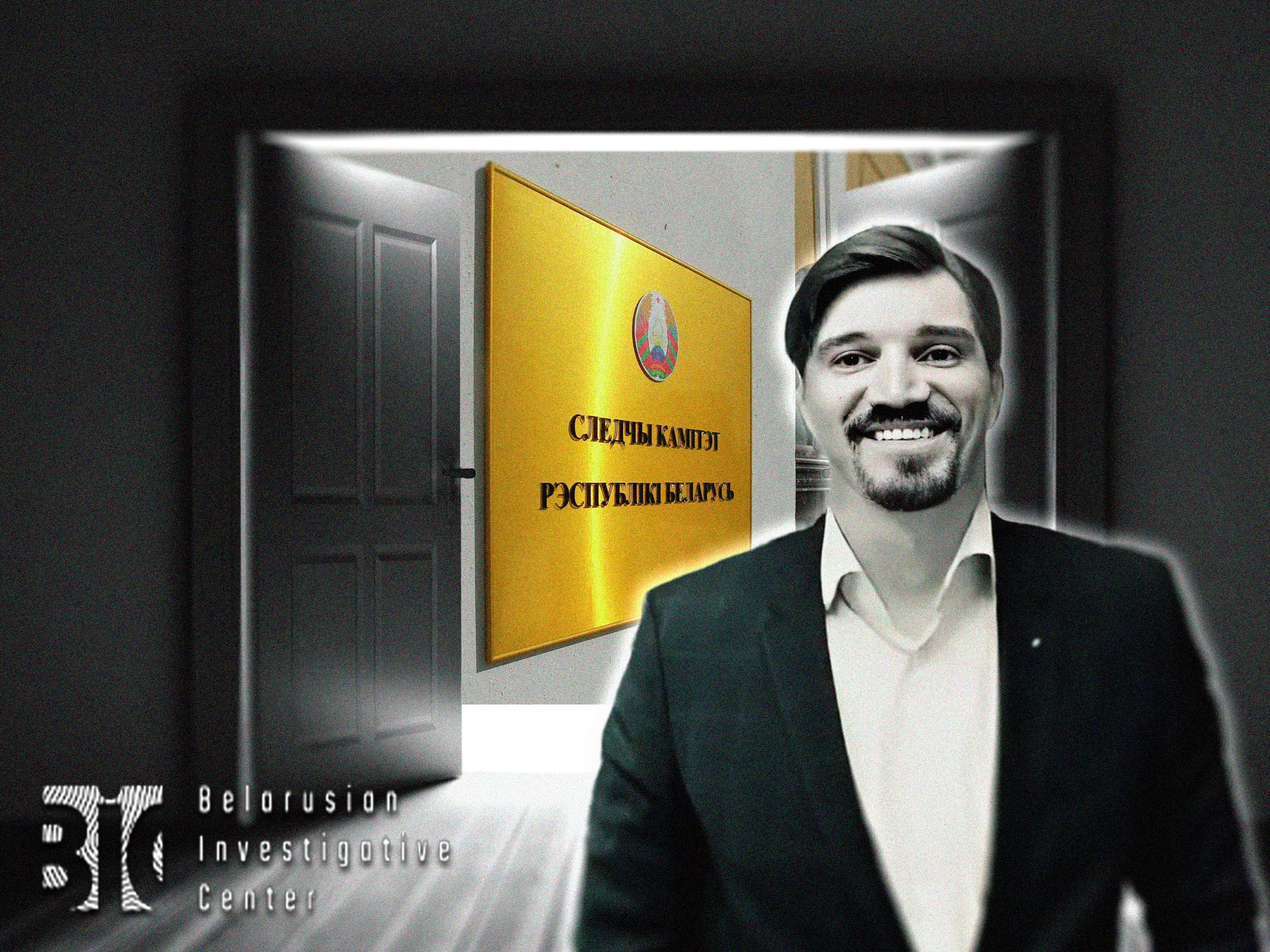The piece was produced in cooperation with Lithuanian media outlet 15min.lt and supported by CyberPartisans.
In September 2023, Aleksandr Lukashenko signed a decree banning the issuance and exchange of identity documents abroad. Now one can get a new passport only on Belarusian territory. However, some Belarusian nationals do not risk travelling to the country — they could face jail time at home.
The United Transitional Cabinet has begun developing a "New Belarus" passport to address the inability of those restricted to travel to their homeland to obtain valid identification documents. In early October 2023, Sviatlana Tsikhanouskaya, leader of the Belarusian Democratic Forces, announced that passport samples were already being printed. It subsequently became known that the production materials were only intended to be procured. The first batch of documents has not yet been released at the time of publication.
The website of the Office of Sviatlana Tsikhanouskaya presents the United Transitional Cabinet of Belarus (UTC) as "a permanent executive body established by the elected National Leader of Belarus,
Sviatlana Tsikhanouskaya, which in the conditions of the political crisis on a collegial basis develops and ensures the adoption and implementation of political decisions necessary to preserve the independence and sovereignty of the Republic of Belarus, overcome the political crisis in Belarus, protect the interests, rights, and freedoms of its citizens and ensure the transition to democratic governance in Belarus".
The United Transitional Cabinet will have to overcome certain challenges to implement this project. First of all, there are difficulties in obtaining an international code that will allow the passport of the "New Belarus" to be recognized by other countries. Secondly, not many companies can produce passports, partly because they risk losing out on contracts with official Minsk and its allies.
THE SHADOW OF CORRUPTION
The Lithuanian company UAB Garsų pasaulis (Lithuanian for "the world of sounds") has been selected to print the "New Belarus" passports, according to 15min.lt. This information was confirmed to BIC journalists by Valery Kavaleuski, a Representative for Foreign Affairs of the United Transitional Cabinet of Belarus. He stated that there is no formal contract with Garsų pasaulis yet, but a memorandum of cooperation has already been signed and a significant amount of preparatory work has been completed.
"These experts have been invaluable in helping us to design the document to be fully compliant with safety requirements", said Kavaleuski.
Garsų pasaulis has extensive experience in handling documents requiring a specified protection class. This company prints passport forms for Lithuanian citizens. On initial examination, the company appears to be an appropriate partner for democratic forces. However, BIC journalists discovered that Garsų pasaulis was involved in corruption scandals.
In 2019, the company Garsų pasaulis was awarded a contract worth approximately $13.5 million to produce biometric passports for the Kyrgyz Republic. In the same year, the Kyrgyzstan State Committee for National Security announced that the winner had sponsored officials to travel abroad and initiated a preliminary investigation. The Pervomaisky District Court of Bishkek convicted three former officials in 2020 for tender irregularities. At the same time, another proceeding was underway. First, in May 2019, the Bishkek Interdistrict Court invalidated the decision of the tender commission recognizing the Garsų pasaulis win. Then the company appealed to the Bishkek City Court and won the case in September 2019. In a further development, the Stockholm International Arbitration Court ruled in favour of Garsų pasaulis in April of this year and ordered Kyrgyz Republic to pay three million euros in compensation.
Further allegations regarding the company were made in 2021. Garsų pasaulis has entered into a contract with the Zimbabwean government to produce e-passports. However, the local press expressed reservations about the project, citing the launch of a similar initiative in 2016 and questioning the necessity of another one.
In Moldova, Garsų pasaulis is involved in a corruption investigation. In the Democratic Republic of Congo in 2017, journalists accused the former co-owner of Garsų pasaulis, the Belgian company Semlex Europe, of corruption. [*] [*] In 2015, the company entered into a contract to produce Congolese passports. Reuters journalists have alleged that a portion of the contract amount was deposited into the accounts of an offshore company owned by a relative of Joseph Kabila, the president of the DRC at the time.
Information about Garsų pasaulis being involved in scandals is publicly available, and the Lithuanian security services are likely aware of it. Despite this, they permit Garsų pasaulis to print forms for important documents. However, it seems that neither Belarusian democratic forces nor Lithuanian agencies were aware of the company's connections with Belarusian businessmen, which were revealed by the BIC investigation.
CHEVTSOV RE-ENTERS THE STAGE
To gain insight into the relationship between Garsų pasaulis and business leaders close to the Belarusian government, it is essential to recall the contributions of Leanid Tanin, a scientist and co-author of numerous patents in the field of optical physics. In our previous investigation, we noted that ZAO Golograficheskaya Industria, his company based in Belarus, produces security holograms. They are used for document tamper-proofing and high-volume goods labeling.
Tanin's second company, OOO Magia Sveta, produces holographic paintings.
These are used by Aleksandr Lukashenko as presents during his official visits. In 2009, the company cooperated with the Belarusian special services: it was involved in the design of a new type of hologram with coded information for the KGB.
Golograficheskaya Industria began to thrive after Viktor Chevtsov began to work with Tanin. The scientist himself told BIC journalists: "[Chevtsov] made a very good move in his time. He gave part of his shares to the state <...>. But in return, the state placed orders with us, consistent orders."
The media referred to Viktor Chevtsov as Lukashenko's "moneybag." Last year's BIC investigation revealed that the businessman, in collaboration with the state, generated profits from Belzarubezhstroy projects in Venezuela between 2007 and the early 2020s. The company fulfilled orders worth at least half a billion dollars at that location. Chevtsov was one of the ultimate owner of ZAO Trustbank, which was previously known as ZAO AKB Infobank. [*] [*] [*] [*] [*] [*] The businessman was a beneficiary of SOOO Belmetallenergo through the aforementioned bank. The company received quotas within the Oil-for-Food Program. The United States suspected Infobank of laundering money for Saddam Hussein's regime and imposed sanctions on it. To be fair, they were later lifted.
The UN launched the Oil-for-Food program in 1995. International sanctions have seriously deteriorated the lives of the people in Iraq.
Saddam Hussein's regime was permitted to export oil under the condition that the revenue would be used to purchase food.
In the early 2000s, a scandal erupted around the program. It was discovered that food was not reaching Iraqis, and oil sales were benefiting the Hussein clan.
In an October 2005 report, a UN committee accused almost half of the 4,500 program participants of paying kickbacks to obtain contracts. The scheme involved Iraq selling oil below market value, which was then resold by its partners. The excess profits were then returned to representatives of Hussein's regime in cash. According to UN calculations, the Hussein regime embezzled a total of $1.8 billion in this way. Belarus, which had close contact with the Hussein regime, was among the states charged by the UN.
A joint Belarusian-Lithuanian enterprise, UAB GP Holographics, has been operational in Vilnius since 2011. It produces security holograms for the European market. Until November 9, 2023, 70% of shares were owned by Belarusian nationals. 40% were held by businessman Viktor Chevtsov, a person familiar to us. 15% were held by director of the Golograficheskaya Industria Alyaksandr Babareka, 10% by Golograficheskaya Industria, and 5% by Alexander Gribovsky, a former Trustbank employee. [*] [*] [*]
Garsų pasaulis has been associated with GP Holographics since the latter was founded. At first, the companies had a common founder – UAB GP GRUPĖ. [*] [*] In 2016, Garsų pasaulis acquired a stake in GP Holographics, becoming a direct shareholder in the joint venture. In June 2022, four months after the commencement of the Russian invasion of Ukraine, including through Belarus, Garsų pasaulis transferred its shares to director Raimondas Krasauskas. He acted as a co-owner for about a year and a half. In November 2023, shortly after the announcement of the development of the "New Belarus" passport, the Lithuanian shares were transferred to Viktor Chevtsov. He ultimately acquired a controlling interest in GP Holographics, holding 70% of the company's shares. In a conversation with journalists from 15min.lt, Krasaukas clarified that he was only a temporary nominal owner of the shares when they were transferred from Garsų pasaulis.
Krasauskas has been serving as the head of GP Holographics while concurrently working at Garsų pasaulis for at least ten years, since 2011. [*] [*] First as head of purchasing, then as export director. The Lithuanian State Social Insurance Fund confirmed that Garsų pasaulis ceased to pay contributions on his behalf in July 2021. [*]
During the investigation, we also received information that may indicate that Krasauskas is still associated with the company today. When BIC journalists called him under the guise of a company that wanted to order holograms, he spoke on behalf of Garsų pasaulis, and only at the end of the conversation did he begin to deny any connection with the company. A security guard in the company's building introduced him to 15min.lt journalists as export director. Besides Krasauskas, Garsų pasaulis and GP Holographics at the time of publication employ the same person as an accountant. [*]
Krasauskas was in contact with employees of the Golograficheskaya Industria and visited Belarus regularly.
For example, in June 2019, he entered Belarus from Lithuania in a passenger car with a former Interior Ministry official, senior police lieutenant Siarhei Syrakvash. [*] [*] [*] The latter worked for Golograficheskaya Industria at least from 2017 to 2020. [*]
Journalists from BIC and 15min.lt contacted the General Director of Garsų pasaulis, Ana Janauskienė, to ask her to comment. She stated that the company received an offer from Golograficheskaya Industria to purchase a hologram approximately 15 years ago. Both companies' specialists have collaborated to enhance the technology used in the production of this item. This made it possible to use it to secure some documents issued by Garsų pasaulis. A joint venture was formed to develop technology and explore new markets. Janauskienė reported that Garsų pasaulis has successfully utilized the GP Holographics security hologram in three export projects, but has never employed it to secure Lithuanian documents.
"In February 2022, a decision was made to stop cooperation with suppliers from the countries that have attacked Ukraine", Ana Janauskienė claims. GP Holographics' last security hologram shipment arrived in January 2023 against a March 2022 order, she said.
TRUST, BUT CHECK YOU MUST
Journalists from BIC and 15min.lt asked the Lithuanian authorities if they knew about the links between Garsų pasaulis and the Belarusian businessman. This information was not previously known to the Identity Documents Personalisation Centre and the Ministry of the Interior, according to the response. Officials noted that the reliability of the service provider and potential threats to national security are assessed by the country's State Security Department (SSD): "The Ministry of Interior has already asked the SSD to evaluate the information you have provided".
Valery Kavaleuski, representing the United Transitional Cabinet, also promised to re-examine Garsų pasaulis. "The information you have shared with us deserves the closest attention", Kavaleuski said. "We believe that confidence in the passport project is 99% of the success of the project itself".
In the case of passport forms for Lithuanian citizens, the personal data are entered by a state agency, not by the document producer. As Valery Kavaleuski discussed in his conversation with the BIC, Garsų pasaulis' involvement in the "New Belarus" passport project includes access to personal data.
The representative of the United Transitional Cabinet has confirmed that Garsų pasaulis will erase the information received after copying it to the passport forms. What is unclear is who will make sure it happens and how. "The data will be stored on servers that are not controlled by Garsų pasaulis", assures Kavaleuski.
Garsų pasaulis CEO Ana Janauskiene said that “the company has all the necessary infrastructure for secure document issuance”.
WHO ARE YOU, COMRADE ZABUGA?
BIC journalists found out how Garsų pasaulis became part of the "New Belarus" passport project and who brought it in.
The Heraldic Council participated in developing new Belarusian documents. It is registered in Lithuania as Pahonia, VšĮ. The organisation is headed by a Belarusian national, Mikita Zabuga. According to Valery Kavaleuski, it was Zabuga who recommended Garsų pasaulis to the Cabinet as the developer of the "New Belarus" passport.
"It was his suggestion, and in that sense, it seemed logical, because we had the opportunity to communicate directly with Garsų pasaulis", said Kavaleuski.
The Heraldic Council has created the Honour and Dignity Medal for the United Transitional Cabinet and the heraldic emblem for the BELPOL Law Enforcers Association.
In addition, the organization is developing the uniform for the future Belarusian army and the design of the "New Belarus" passport.
The media refer to Mikita Zabuga as a businessman and cultural and historical figure. It was reported that in 2013 Zabuga sponsored the installation of a monument in honour of the 150th anniversary of Kastus Kalinouski's uprising near the village of Slabodka in Astravets District. In 2015, he joined the board of the Belarusian Culture Society in Lithuania. In 2016, he financed the opening of a memorial plaque for the poet and priest Kazimir Svajak in Vilnius. In 2017, he collaborated with archaeologists to excavate Kalinouski's remains. Subsequently, Sviatlana Tsikhanouskaya presented the team with the Badge of Honour. Zabuga is frequently seen in public photos and videos with her associates.
BIC journalists uncovered pertinent information in the biography of the head of the Heraldic Council, which is worthy of attention given his involvement in the sensitive project of the "New Belarus" passport. Zabuga graduated from the Academy of the Ministry of Internal Affairs of the Republic of Belarus in 2002. [*] By his own account, with honours. He worked as an investigator in the Minsk Region Directorate of the Investigative Committee, as well as in the Rapid Response and Criminal Investigation Unit of the Traffic Police of the Internal Affairs Department under the Hrodna Regional Executive Committee. [*] [*] After his resignation in 2003, he moved to Lithuania where he presented himself as an activist, philanthropist, and businessman.
Despite his cooperation with the democratic opposition, Mikita Zabuga continued to do business in Belarus. Until March 13, 2023, he was one of the co-owners of OOO Ferrata, an advertising sales company at Minsk National Airport. Zabuga did not give a direct answer to a BIC journalist’s question about the possibility of running a "business that the authorities don't meddle in". He said he had never been to the Ferrata office and had sold his shares long ago. By the way, the former policeman Yury Misko has been another co-owner of the company since its establishment in 2010. He remains the sole owner at the time of publication. [*] [*] [*]
In December 2020, four months after the start of mass protests against the rigged presidential election in Belarus, Zabuga and his partner registered a new company, OOO DoilidBel, in the country. According to the state register of Belarusian companies, it operates in the real estate sector. Seven months later, he transferred his stake to the Lithuanian company UAB Tėvuko Statyba. [*] [*] The firm is owned by Manvydas Šmigelskas, who also serves as a director and a co-owner of the Lithuanian company UAB Žemės Plėtra. 33% of it belongs to Zabuga's wife, Santa Savickaja-Zabuga, and 47% - to the firm of his of his Belarusian business partner, Lithuanian national Aušrys Žukauskas. [*] [*] [*] [*] [*] [*]
At the time of this investigation, Mikita Zabuga is a co-owner of the Belarusian companies OOO RastisCapital and OOO ROSSEMservice. [*] [*] [*] [*]
Furthermore, our attention was drawn to the registered office address of the two Zabuga companies: it coincides with that of the Astravets Police Department. We are referring to OOO Rastis, which was registered there from 2012 to 2015, and RastisCapital, with a statutory seat at the address from 2013 to 2015. [*] [*] [*] [*] The representative of the Police Department informed journalists that the building is solely used by the police. Several individual entrepreneurs and another company are registered at the same address, according to the Legat.by service.
We reached out to Mikita Zabuga for comment. He was initially unable to recall the registered office addresses of the two firms. The following day, he informed us that someone had registered his companies in a building adjacent to the police department, but with the same building number. According to publicly available maps, the building next door has a different number than the one for the police department.
Zabuga was part of a split in the Belarusian Cultural Society in Vilnius in 2015, which resulted in the then-head of the organisation's board, Fiodor Niunko, losing his position.
At the time, the organisation's website stated that the crisis was the result of disputes over the Society's real estate holdings. Niunkо was accused of unlawfully exchanging a mansion in central Vilnius for an apartment. He himself stated that a group of people, including Zabuga, tried to smear him. In Vilnius, a trial was held to consider a claim for invalidation of a real estate exchange transaction. The court ruled in favour of the defendant, Niunkо, and he was awarded legal costs compensation of 3,000 euros. [*] [*] However, the Belarusian diaspora in Lithuania is still concerned about the activities of the former society head.
Although Zabuga officially retired from the police force in 2003 with the rank of senior lieutenant, he maintained contact with one of the law enforcement officers for a further ten years. According to CyberPartisans, in 2013 Zabuga travelled to Lithuania in a car with a Vadzim Hryts, an investigator in two scandalous cases. [*]
He led the investigation into the terrorist attack on the Minsk metro, which resulted in the death penalty for Dzmitry Kanavalau and Uladzislau Kavalou. The Russian First Channel produced a special edition of the programme "Man and Law" on this topic, after which Hryts was awarded the medal "For Distinction in the Protection of Public Order". The findings of the investigation and the court decision were met with scepticism by the majority of respondents in Belarus, according to the survey conducted by the Independent Institute of Socio-Economic and Political Studies.
Another high-profile case that Vadzim Hryts handled was "Teddybear Airdrop". In 2012, Swedish activists conducted an unauthorised flight from the territory of Lithuania on light aircraft, dropping teddy bears with leaflets in support of freedom of speech over Belarus.
In addition to their 2013 trip abroad, Mikita Zabuga accompanied Hryts on a 2007 overseas journey. [*] The businessman informed BIC reporters that he had no recollection of such trips. However, he did admit that he had known Hryts since his days at the Academy of the Ministry of Internal Affairs.
"THERE CAN BE NO ROOM FOR AMBIGUITY"
The only way to allay concerns and mitigate risks associated with the "New Belarus" passport project is through "maximum transparency", said Vytis Jurkonis, Project Director of the Lithuanian office of Freedom House.
"Given the sensitivity of this project, it is clear that there can be no room for ambiguity. It should be as transparent as possible. So that both the people pinning hopes on this project and the states considering recognising such a passport have a full picture of all the risks and solutions presented by this document", Jurkonis stressed.
BIC journalists requested information from Sviatlana Tsikhanouskaya's Chief Advisor, Franak Viachorka, regarding his knowledge of Zabuga's business activities in Belarus after 2020 and his interactions with investigator Hryts. Viachorka claimed he was not aware of these facts. He undertook to verify this information and noted that Sviatlana Tsikhanouskaya's office has no working relationship with Zabuga.
Journalists from the Belarusian Investigation Center tried to contact Viktor Chevtsov. But there has been no response from the businessman, either by phone or in writing.
This materials/publication/video was produced with the financial support of the European Union. Its content represents the sole responsibility of the EU4IM Project, financed by the European Union. The content of the materials/publication/video belongs to the authors BIC and does not necessarily reflect the vision of the European Union.




